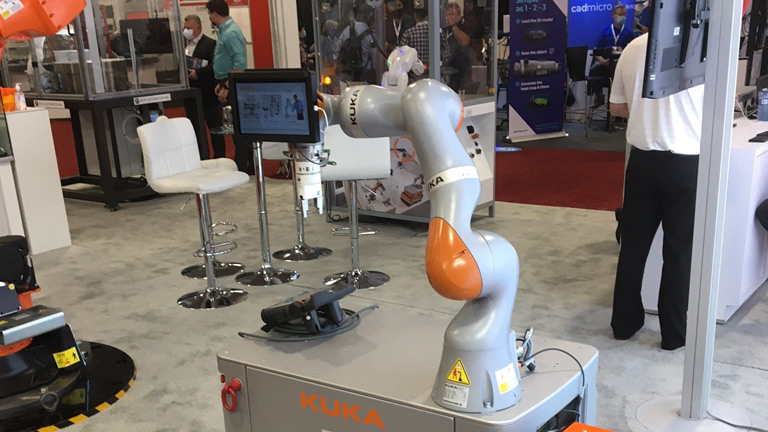[ad_1]

MISSISSAUGA, Ontario – The 2021 edition of CMTS examined the challenges and opportunities for Canadian manufacturers.
The show, held at the International Centre near Toronto, was held this week as manufacturing tries to move on from the COVID-19 pandemic. It was the first CMTS event since COVID spread across North America in 2020. The show also was one of the first significant in-person events in Canada after the arrival of COVID.
Show speakers said changes in various industries can present manufacturers an opening to enter new markets.
“You have to find ways of doing something different,” Mike Brownhill, an official at Export Development Canada, said during one of the show’s keynote presentations.
“For all the dark clouds, there is good news to come. Focus on the windshield, not on the rear-view mirror.”
Export Development Canada is a crown corporation, owned by the Canadian government. EDC provides financial services to spur trade between Canada and other countries. It is like the Export-Import Bank of the United States.
The talk by Brownhill, commercial account director, advanced manufacturing for EDC, concerned dealing with managing risk among “black swans,” or unpredictable events.
In the past two years, Brownhill said, manufacturers have dealt with black swans such as COVID, the grounding of Boeing Co.’s 737 Max and the current semiconductor shortage.
Amid such calamities, Brownhill said manufacturers have coped by diversifying their offerings or using creativity.
“If you don’t change, you don’t survive,” he said. “Take smart risks.”
One recurring theme throughout the show concerned how technology is transforming manufacturing.
“The lines between manufacturing, services and tech are becoming blurred,” Jayson Myers, CEO of Next Generation Manufacturing Canada (NGen), said during an address at CMTS. “The business of manufacturing is changing. Competition is intense. In manufacturing, we’re in a global marketplace here.”
NGen describes itself as a supercluster that aims to promote the development of advanced manufacturing in Canada. Myers said in his presentation that manufacturing is reducing carbon emissions to combat global warming.
The auto industry’s drive to develop electric vehicles also will affect Canada, which has auto plants of both U.S.- and Asian-based companies.
Project Arrow
Automakers are “all EV companies,” Flavio Volpe, president of Canada’s Automotive Parts Manufacturers’ Association, said during one CMTS speech. “They’re not developing the internal combustion engine anymore. We’re going to redefine what a car is.”
One example of the trend took place last week. Ford Motor Co. announced the automaker and SK Innovation would invest about $5.6 billion to construct a campus in west Tennessee to produce the next-generation of electric F-Series trucks and batteries. The move will create about 6,000 jobs.
The campus will be dubbed Blue Oval City. Ford said in a statement the complex will include “vertically integrated ecosystem with key suppliers, worker education and training facilities, and battery manufacturing and recycling on-site.”
Canda needs to adjust to the shift to EVs, Volpe said at CMTS
Volpe’s organization has announced Project Arrow, an effort to build a prototype EV using all-Canadian technology in 2022. “We have it all here,” he said.
At another CMTS session, there were calls for Canadian manufacturers to adopt digital technology in general.
Canada is behind the U.S. and Europe in making use of digital tech, said Mathew Wilson, senior vice president of policy, government relations, and Ontario division of the Canadian Manufacturers & Exporters. “We’re not adopting enough of it here in Canada.”
That may be changing, said Damien Johnston, vice president of business solutions for TELUS. “We’re seeing an acceleration in the adoption of digital,” he said.
[ad_2]
Source link








